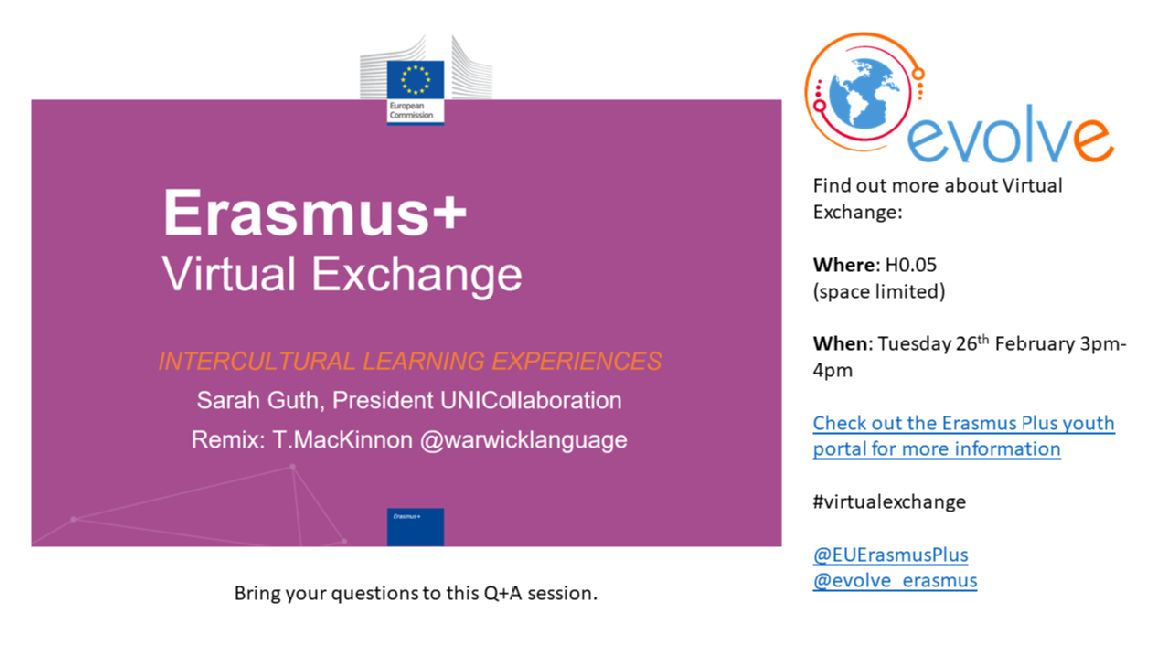Latest News
Erasmus Plus Virtual Exchange Q+A
This European initiativeLink opens in a new window aims to extend collaborative opportunities between HEIs to increase internationalisation in all disciplines. Training for staff development is provided free of charge and takes place online. Come and find out how you and your students can benefit.

Open badges and Online Intercultural Exchange
The Clavier virtual exchange project is now in its 4th year and this year implemented open badges to credentialise the computer-mediated communication skills our participants are acquiring.
En visite
The Language Centre is pleased to welcome students and staff from the Université Blaise Pascale, Clermont Ferrand, France this week as part of the Clavier project . Students are being hosted by Warwick language students and have been participating in a range of visits and activities including a guided tour of the Life Sciences facilities, a celebratory meal at Wagamamas in Leamingont and trips to London and Stratford. The students have connected to each other through our virtual exchange #warcler an innovation in language exchange which involves using social media and computer-mediated communication to reduce intercultural barriers. The Clavier project began in 2010, is research led and has led to staff and student exchange visits supported by Erasmus funding.
. Students are being hosted by Warwick language students and have been participating in a range of visits and activities including a guided tour of the Life Sciences facilities, a celebratory meal at Wagamamas in Leamingont and trips to London and Stratford. The students have connected to each other through our virtual exchange #warcler an innovation in language exchange which involves using social media and computer-mediated communication to reduce intercultural barriers. The Clavier project began in 2010, is research led and has led to staff and student exchange visits supported by Erasmus funding.
Languages@Warwick migration
To all Languages@Warwick users.
After a complete platform review this year we have decided to change our hosting provider to Moodlerooms . This will bring numerous advantages including:
. This will bring numerous advantages including:
o a more modern look and feel
o better support for our key plug ins (BB collaborate, Kaltura, Equella)
o additional reporting and analytics for all users
o easier sub-theming for other users who have their own categories on the site
Speak to the Future Campaign
New campaign calls for urgent action on languages
A new campaign, branded Speak to the Future, has been launched with the support of over 30
organisations to address the UK’s flagging achievement in language learning. The campaign calls
for urgent action on policy to safeguard and revitalise language learning across all phases of
education in order to boost educational and career opportunities for young people and our ability to
compete in the global economy. Campaigners have united to send a powerful public message
highlighting the vital national importance of foreign language capacity in today’s global world.
Languages in Europe: Theory, policy, practice
The LETPP project - Languages in Europe: Theory Policy Practice - has just launched its website:
Multilingualism has been described as an "asset for Europe and a shared commitment". This may, however, be more a vision of what might be than a description of reality. Reality is mediated not only by the vision (what people think), but by policy decisions (laws and regulations) and by performance (what we actually do).
A one year project - LETPP - has therefore been initiated in order to identify the conditions which allow good ideas on multilingualism to develop into coherent policy and practice, and also the obstacles to that happening. By policy we mean European, national and regional strategies which promote or inhibit linguistic diversity in social and economic life, and also specific measures which may support that diversity, such as the Lifelong Learning Programme.
